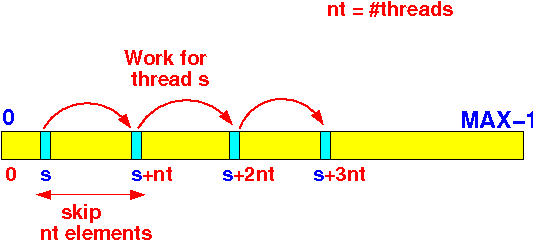An alternate way to
distribute the
work load
- Alternate way
to distribute the
work load for
2 threads:
values handled by thread 0
| | | | | | | | | | | | | |
V V V V V V V V V V V V V V
|-|-|-|-|-|-|-|-|-|-|-|-|-|-|-|-|-|-|-|-|-|-|-|-|-|-|-|
^ ^ ^ ^ ^ ^ ^ ^ ^ ^ ^ ^ ^ ^
| | | | | | | | | | | | | |
values handled by thread 1
Thread 0 Thread 1
| |
| |
V V
Tmin[0] Tmin[1]
\ /
\ /
\ /
\ /
\ /
main thread
|
|
V
Actual minimum
|
|
The work load processed by
thread s
- The work load
handled by
the thread s is
as follows:

- The
for-loop
used to
process the
work load of
thread
s is:
// n = # threads used
for ( int i = s; i < MAX; i = i + n )
{
}
|
|
The alternate
worker( )
function
- The
worker( )
has the parameter
id which
identifies the
segment that
the thread must
process:
void *worker(int *id) // *id = identifies the series starting at s below
{
double my_min;
int s = *id; // *id = 0, 1, 2, ...or (N-1)
my_min = x[s]; // Initial value for the min
for (int i = s+N; i < MAX; i = i + N )
if ( x[i] < my_min )
my_min = x[i];
Tmin[s] = my_min; // Save result in Tmin[s]
pthread_exit(NULL); // Thread exits
Input x[ ]:
+---+---+---+---+---+---+---+---+---+---+---+---+---+---+---+---+
| | | | | | | | | | | | | | | | |
+---+---+---+---+---+---+---+---+---+---+---+---+---+---+---+---+
^ ^ ^ ^
| | | |
s s+N s+2N s+3N
}
|
|
The alternate
worker( )
function
-
Copy the
argument
*id into
the variable
s
(more convenient):
void *worker(int *id) // *id = identifies the series starting at s below
{
double my_min;
int s = *id; // s = one of: 0, 1, 2, ...or (N-1)
my_min = x[s]; // Initial value for the min
for (int i = s+N; i < MAX; i = i + N )
if ( x[i] < my_min )
my_min = x[i];
Tmin[s] = my_min; // Save result in Tmin[s]
pthread_exit(NULL); // Thread exits
Input x[ ]:
+---+---+---+---+---+---+---+---+---+---+---+---+---+---+---+---+
| | | | | | | | | | | | | | | | |
+---+---+---+---+---+---+---+---+---+---+---+---+---+---+---+---+
^ ^ ^ ^
| | | |
s s+N s+2N s+3N
}
|
|
The alternate
worker( )
function
-
Find the
minimum value
in
the series of values
starting at
x[s]:
void *worker(int *id) // *id = identifies the series starting at s below
{
double my_min;
int s = *id; // s = one of: 0, 1, 2, ...or (N-1)
my_min = x[s]; // Initial value for the min
for (int i = s+N; i < MAX; i = i + N ) // N = # threads
if ( x[i] < my_min )
my_min = x[i];
Tmin[s] = my_min; // Save result in Tmin[s]
pthread_exit(NULL); // Thread exits
Input x[ ]:
+---+---+---+---+---+---+---+---+---+---+---+---+---+---+---+---+
| | | | | | | | | | | | | | | | |
+---+---+---+---+---+---+---+---+---+---+---+---+---+---+---+---+
^ ^ ^ ^
| | | |
s s+N s+2N s+3N
}
|
|
The alternate
worker( )
function
-
Save the
minimum value
in Tmin[s] and
exit:
void *worker(int *id) // *id = identifies the series starting at s below
{
double my_min;
int s = *id; // s = one of: 0, 1, 2, ...or (N-1)
my_min = x[s]; // Initial value for the min
for (int i = s+N; i < MAX; i = i + N ) // N = # threads
if ( x[i] < my_min )
my_min = x[i];
Tmin[s] = my_min; // Save result in Tmin[s]
pthread_exit(NULL); // Thread exits
Input x[ ]:
+---+---+---+---+---+---+---+---+---+---+---+---+---+---+---+---+
| | | | | | | | | | | | | | | | |
+---+---+---+---+---+---+---+---+---+---+---+---+---+---+---+---+
^ ^ ^ ^
| | | |
s s+N s+2N s+3N
}
|
|
DEMO:
demo/pthread/min-mt2.c
(use euler to
demo) --
why is its
slower than
min-mt1.c ???)
❮
❯
